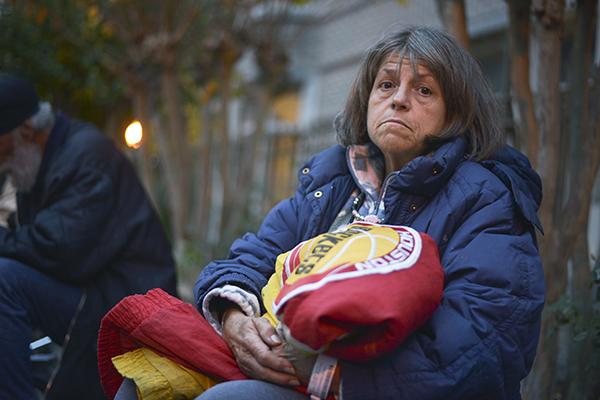The city is breaking up a homeless encampment on Virginia Avenue.
The number of homeless people living in the tent encampment near the Watergate Complex has grown “exponentially” from the dozen or so that previously lived there, before the city cleared some of them out on Friday, an advocate for local homeless people said. City officials said this move is the first step for moving the population to a safer location, but a local advocate said the homeless were being forced out because of the amount that have moved to that location.
D.C.’s Office of the Deputy Mayor for Health and Human Services left a notice for a 14-day notification period at the site near Virginia Avenue, warning the homeless people living in tents there that the city will clear them out when the period came to a close, the office said in a statement. Officials said they cleared the area on Friday afternoon.
Brenda Donald, the deputy mayor for Health and Human Services, said in the statement Friday that the encampment is “unhealthy and unsafe” for the people there. He said the agency is clearing them out because of the poor conditions: no bathrooms, shelter or running water.
“Our plan is to work with people living there illegally – on an individual basis – to connect them with the resources they need to move into a safe place and out of the elements,” she said.
Donald said the office has been trying to get residents in that particular encampment services like housing, food and mental health resources for months, adding that 14 of the former residents who lived there have been moved into housing. She said the agency will continue to monitor the areas in case other people go there.
Becky, 64, a homeless woman who asked to be identified by her first name only, was told to relocate from the Virginia Avenue encampment last week, said she and her son have previously been forced to relocate from homeless shelters and encampments in places like Colorado, Washington State, Idaho and Texas, before returning to D.C.
“I have been living like this for a very long time, out on the streets, homeless. Initially I was trying to get assistance from government agencies, but it just kept falling on deaf years,” she said.
Mayor Muriel Bowser has been working to close D.C.’s largest homeless shelter, D.C. General, because of its unsafe conditions. In September, city officials unveiled plans to place local homeless people directly into permanent housing instead of temporary housing in a shelter.
Last year, when the number of homeless people on the streets was expected to eclipse the numbers from previous years at a projected 900 families, local homeless shelters felt pressure from the increase that crowded the organizations’ space and resources.
Gunther Stern, the executive director of the Georgetown Ministry Center, said this is not the first time that homeless people have occupied the area, but the use of the tents was a “different issue” for the city because they attracted a larger number of people into the encampments than usual.
“This is the first time there have been tents,” Stern said. “Some well-meaning person has been getting them in, bringing them in and then giving them to people.”
He said people flocked to the encampment because they believed they would have a better shot at getting housing from the city, after the city found permanent housing for some of those who were previously at the site.
“So they were down there working really diligently with the people and the word got out and people started to come in,” he said. “So basically it became its own problem.”
He added that Georgetown Ministry Center, which offers homeless people a place to get out of the cold during the day, is at capacity and can’t take the additional people. He said he predicts the people will just move to other places, which will likely bother the residents already there.
“I think we may see some of the tents pop up in places that will make other people uncomfortable,” he said. “So if it’s a problem now, it is soon going to be a problem for somebody else.”








